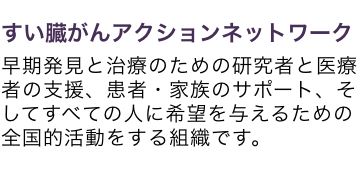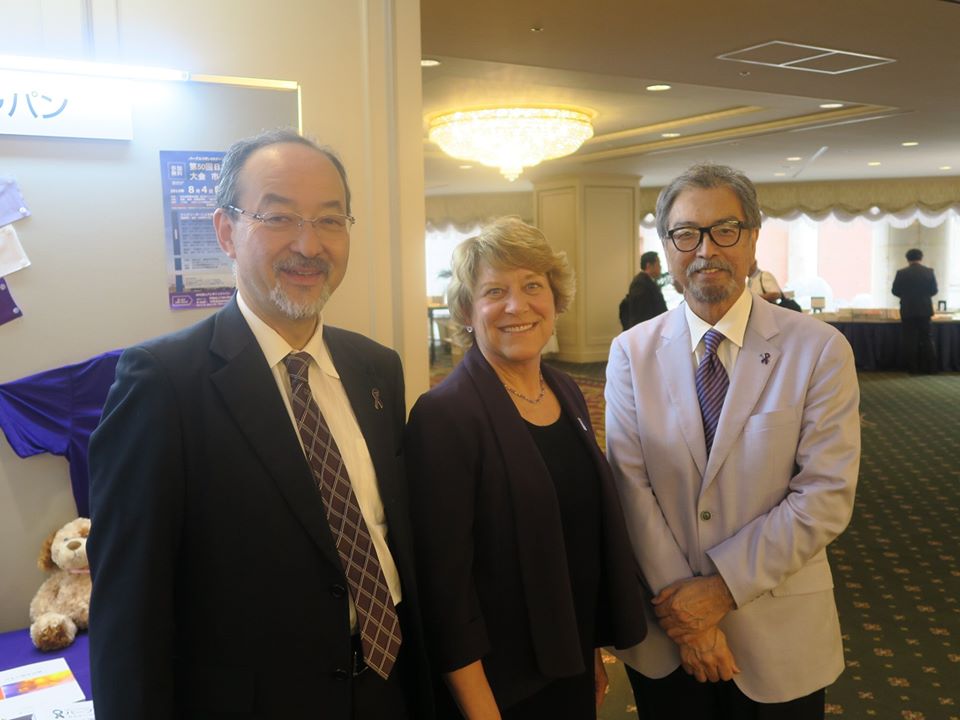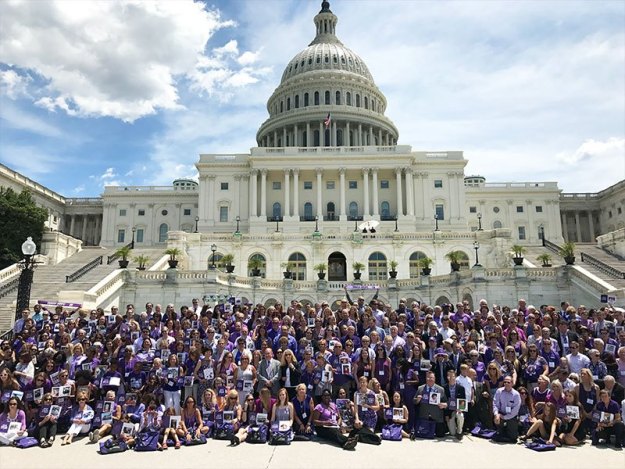PANCREATIC CANCER NEWS & UPDATES
OCTOBER 2015
PANCREATIC CANCER ACTION NETWORK AND COMMUNITY NEWS
Apply now! Pancreatic Cancer Action Network’s 2016 Research Grants Program
https://www.pancan.org/research-grants-program/apply-for-a-pancreatic-cancer-research-grant/
The Pancreatic Cancer Action Network’s research investment for 2016 will be $9.7 million, representing a
more than 40 percent increase over last year’s investment. Of this total, $6.8 million will be awarded
through our competitive Research Grants Program. We are now accepting applications for our
translational and clinical research grants. Please let us know if you have any questions. And, spread the
word to your colleagues!
The Pancreatic Cancer Action Network is leading the way to change pancreatic cancer history
with $200 million by 2020
https://www.pancan.org/section-about/news-press-center/2015-press-releases/press-release-october-22-
2015-200-million-goal/
The Pancreatic Cancer Action Network is leading the way to change the course of history for pancreatic
cancer with a new goal to raise $200 million by 2020. Funding will allow the organization to significantly
increase its investment in research efforts and continue to invest in groundbreaking research and clinical
care that can improve patient outcomes.
Clinical Trial Finder
https://clinicaltrials.pancan.org/
The Pancreatic Cancer Action Network has launched its Clinical Trial Finder to healthcare professionals.
The Clinical Trial Finder allows healthcare professionals to quickly, and accurately, find clinical trials for
their pancreatic cancer patients. Through an easy-to-use interface, our current and comprehensive
database of U.S. clinical trials that we have been using to conduct personalized clinical trial searches is
now fully accessible to healthcare professionals, 24/7, by registering for a free account. Note that
pharmaceutical and other industry professionals are also invited to set up an account to access our
database and assess the landscape to better inform their planning of future trials.
Know Your TumorSM: Powerful knowledge, personal treatment
https://www.pancan.org/knowyourtumor/
Information for the general public: https://www.pancan.org/section-facing-pancreatic-cancer/know-yourtumor/
The Know Your TumorSM initiative is designed to provide pancreatic cancer patients and their treating
oncologists with access to molecular information about patients’ tumors, to support an outcomes registry
to capture patient experiences, to provide expert physician review to improve outcomes for current and
subsequent patients, and to reduce barriers to clinical trial enrollment.
Funding opportunities:
Apply Now! Pancreatic Cancer Action Network’s 2016 Research Grants Program
https://www.pancan.org/research-grants-program/apply-for-a-pancreatic-cancer-research-grant/
Apply at: https://proposalcentral.altum.com/
Research Acceleration Network-2 Grant, Application deadline: January 15, 2016
Research Acceleration Network Grant, Application deadline: January 15, 2016
Translational Research Grant, Application deadline: January 29, 2016
The Pancreatic Cancer Action Network’s research investment for 2016 will be $9.7 million, representing a
more than 40 percent increase over last year’s investment. Of this total, $6.8 million will be awarded
through our competitive Research Grants Program. We are now accepting applications for our
translational and clinical research grants. Please let us know if you have any questions. And, spread the
word to your colleagues!
Deadline approaching! NCI Pancreatic Cancer Detection Consortium (U01)
http://grants.nih.gov/grants/guide/pa-files/PAR-15-289.html
Application deadlines: November 25, 2015, and May and September 2016 and 2017, and April 2018
The NCI is inviting applications from multidisciplinary teams of researchers and clinicians to establish the
Pancreatic Cancer Detection Consortium (PCDC) to conduct research to improve the detection of earlystage
pancreatic ductal adenocarcinoma and the characterization of its precursor lesions. The PCDC is
aimed at addressing one of the four key priority areas identified by the Scientific Framework for
Pancreatic Adenocarcinoma (http://deainfo.nci.nih.gov/advisory/ctac/workgroup/pc/pdacframework.pdf),
created by the NCI in response to the Recalcitrant Cancer Research Act of 2012, whose passage was
spearheaded by Pancreatic Cancer Action Network advocates.
New! Neuroendocrine Tumor Research Foundation-AACR Grant
http://www.aacr.org/Funding/Pages/FundingDetail.aspx?ItemID=33&utm_campaign=funding&utm_content=netaacr&utm_medium=twitter&utm_source=social&utm_term=aacr#.VkpF73arSUk
Application deadline: January 12, 2016
The Neuroendocrine Tumor Research Foundation-AACR Grant represents a joint effort to promote and
support innovative cancer research. This grant is available to full time, independent junior and senior
investigators to develop and study new ideas and innovative approaches that have direct application and
relevance to neuroendocrine tumors. Proposed research may be in any discipline of basic, translational,
clinical, or epidemiological cancer research.
New! Nano Startup Challenge in Cancer
http://www.nscsquared.org/
Entries to the Challenge due: February 11, 2016
The National Cancer Institute’s (NCI) Alliance for Nanotechnology in Cancer and the Center for
Advancing Innovation have partnered to create a "first of a kind" Nanotechnology Startup Challenge in
Cancer or NSC2
. The Challenge will feature 4-6 National Institutes of Health (NIH) intramural inventions
which can be applied to cancer interventions, are important to public health, and have commercial
viability. Teams may select one of these inventions upon which to build business plans and startups.
Teams may also elect to bring alternative commercially viable, nanotechnology cancer-related inventions
into the challenge. The primary goal of the Challenge is to stimulate the creation of start-up businesses
based upon these inventions.
New! Cancer Research UK Grand Challenge
www.cruk.org/grandchallenge
Expression of Interest closes: February 13, 2016
Grand Challenge awards will support the best scientists from around the world and enable the optimal
mix of disciplines and approaches. Teams must have a strong UK component with at least 25% of the
grant spent in the UK.
Postdoctoral fellow and/or research associate positions available: Department of
Medicine/Division of Gastroenterology & Hepatology
Contact: Ron McKinney (このメールアドレスはスパムボットから保護されています。閲覧するにはJavaScriptを有効にする必要があります。) with an uploaded pdf version of your CV
The Department of Medicine at the University of Illinois-Chicago is seeking to fill one or two Postdoctoral
Fellow/Research Associate positions in the laboratory of Dr. Paul Grippo. These two positions differ in
scope though they are intricately involved in exocrine pancreatic disease and the role of the TME during
these processes. Projects in the laboratory are focused on the roles of diet, inflammation, and genetic
changes that contribute to the etiology of pancreatitis and pancreatic cancer as well as the means to
detect and treat pancreatic neoplasia and cancer. Experience with notable technologies including protein
pathway evaluation (western, IP, IHC, & IF), PCR (genotyping & realtime expression), flow cytometry, and
ELISA using cell culture (lines and primaries) and animal models (primarily mouse) is highly desirable.
Postdoctoral position available
Contact: このメールアドレスはスパムボットから保護されています。閲覧するにはJavaScriptを有効にする必要があります。
The University of Miami, Department of Surgery has an immediate opening for a Post Doctoral Associate.
The main focus will be to carry out novel research on the role of obesity in cancer biology. This individual
will take a multidisciplinary approach to understand the basic mechanisms of tumorigenesis and tumor
metastasis, which will include the use of biochemistry, cell biology, immunology, molecular biology,
proteomics, animal modeling and mouse genetics, translational medicine, and/or the use of human tumor
models.
Meetings:
The Function of Tumor Microenvironment in Cancer Progression
http://www.aacr.org/Meetings/Pages/MeetingDetail.aspx?EventItemID=73#.VhgEbflVhBd
Meeting: January 7-10, 2016, Hard Rock Hotel, San Diego, CA
This AACR Special Conference will focus on discussing the emerging concepts in stromal cell and
extracellular matrix heterogeneity, stromal cell metabolism, early events in carcinogenesis involving
contributions from tumor cells and their microenvironment, stress responses to oxygen and nutrient
gradients, translational impact of targeting the microenvironment, tumor immunity and immunotherapy.
Therapeutic opportunities revealed by these innovative and interdisciplinary discoveries will also be
discussed.
2016 Gastrointestinal Cancers Symposium (GI ASCO)
http://gicasym.org/?cmpid=db_gi_abst_ascoex_-_all_08-18-
15_gihtml&et_cid=36539459&et_rid=977587026&linkid=Gastrointestinal+Cancers+Symposium
Meeting: January 21-23, 2016, Moscone West Building, San Francisco, CA
Hotel Reservation and Early Registration Deadline: December 16, 2015
The Gastrointestinal (GI) Cancers Symposium is a specialized oncology event designed to provide
scientific and educational content for members of the GI cancer care and research community. This threeday
meeting encompasses the latest science in cancers of the esophagus and stomach; the pancreas,
small bowel, and hepatobiliary tract; and the colon, rectum, and anus. This year’s Symposium will offer
new breakout sessions covering cutting-edge and controversial topics, a networking luncheon for early-
career oncologists, and the opportunity to view and discuss selected posters with respected faculty
members during poster walks.
National Pancreas Foundation Fellows Symposium
https://www.pancreasfoundation.org/pancreas-community/medical-community/fellows-symposium/
Meeting: April 8-10, 2016, Eaglewood Resort and Spa, Itasca, IL
Application deadline: January 22, 2016
The National Pancreas Foundation holds an annual Fellows Symposium as an opportunity for Fellows to
gain insights and instruction from renowned specialists.
AACR Annual Meeting 2016
http://www.aacr.org/Meetings/Pages/MeetingDetail.aspx?EventItemID=63#.VaK3L_lVikp
Meeting: April 16-20, 2016, Ernest N. Morial Convention Center, New Orleans, LA
Abstract Submission Deadline: December 1, 2015
Advance Registration Deadline: December 18, 2015
The AACR Annual Meeting is a must-attend event for cancer researchers and the broader cancer
community. This year's theme, "Delivering Cures Through Cancer Science," reinforces the inextricable
link between research and advances in patient care.
International Conference on Pancreatic Disorders and Treatment
http://pancreas.conferenceseries.com/call-for-abstracts.php
Meeting: May 12-14, 2016, Doubletree by Hilton, North Shore, Chicago, IL
International Conference on Pancreatic Disorders and Treatment, will be organized around the theme
“Research oriented Innovations in Pancreatic Cancer Disorder Treatment and Diagnostic Techniques.”
Save the Date! AACR Special Conference on Pancreatic Cancer
http://www.aacr.org/Meetings/Pages/MeetingDetail.aspx?EventItemID=82#.Vh2JN_lVhBe
Meeting: May 12-15, 2016, JW Marriott Orlando Grande Lakes, Orlando, FL
The third AACR Special Conference on Pancreatic Cancer will be chaired by Dr. Manuel Hidalgo and
grantees and Scientific and Medical Advisory Board members Drs. Christine Iacobuzio-Donahue and
Robert Vonderheide. The Pancreatic Cancer Action Network will again serve as a lead supporter of this
conference. More info coming soon!
2016 ASCO Annual Meeting: Key dates
http://am.asco.org/key-dates
Meeting: June 3-June 7, 2016, Chicago, IL
Member Registration and Hotel Reservations Open: October 28, 2015
Abstract Submitter Opens: November 13, 2015
ASCO wants to ensure that you never miss a deadline. From the opening of registration and hotel
reservations to the release of abstracts, keep these dates in mind as you prepare to attend the 2016
ASCO Annual Meeting.
The International Symposium of Pancreas 2016 – Precision Medicine for Pancreatic Cancer
http://www.glasgowcancer.org/meetings/pancreas-2016/
Meeting: June 9-12, 2016, University of Glasgow, Scotland, UK
Abstract Submission Deadline: February 2016
Abstract Acceptances: March 2016
Early Registration Deadline: March 2016
The International Symposium of Pancreas 2016 – Precision Medicine for Pancreatic Cancer – will take
place at the University of Glasgow from 9 – 12 June 2016.
Other community news:
New journal: Case Reports in Pancreatic Cancer
http://www.liebertpub.com/crpc
Mary Ann Liebert, Inc., publishers is pleased to announce the November launch of Case Reports in
Pancreatic Cancer during Pancreatic Cancer Awareness Month. The Journal is open access and
publishes authoritative case reports on all aspects of pancreatic cancer diagnosis, management,
treatment, and outcomes. It is edited by Dr. Charles J. Yeo, MD, FACS, Samuel D. Gross Professor and
chair of the Department of Surgery at the Sidney Kimmel Medical College of Thomas Jefferson University
in Philadelphia, Pennsylvania. Case Reports in Pancreatic Cancer enables clinicians, cancer scientists,
and the team of professionals that administer care, to share their medical experiences as well as foster
communication and collaboration to optimize patient care. Visit the Journal’s website to learn more and
read the latest case reports. Also, two-time Pancreatic Cancer Action Network grantee Jonathan Brody,
PhD, is an associate editor for this journal.
NYU Langone Medical Center appoints renowned physician-scientist Alec Kimmelman, MD, PhD,
as new chair of radiation oncology
http://nyulangone.org/press-releases/nyu-langone-medical-center-appoints-renowned-physician-scientistalec-kimmelman-md-phd-as-new-chair-of-radiation-oncology
Internationally renowned clinician-scientist Alec Kimmelman, MD, PhD (recipient, 2010 Career
Development Award), has been named Chair of the Department of Radiation Oncology at NYU Langone
Medical Center. His appointment is effective February 1, 2016. Congratulations, Alec!
BIDMC names Manuel Hidalgo, MD, PhD, Clinical Director of the Cancer Center and Chief of
Hematology-Oncology
http://www.bidmc.org/News/In-Medicine/2015/October/Hidalgo.aspx
Manuel Hidalgo, MD, PhD, an internationally respected oncologist whose groundbreaking work in
experimental cancer therapy and tumor model development has led to key advances in the treatment of
pancreatic cancer, has been named Director of the Leon V. & Marilyn L. Rosenberg Clinical Cancer
Center and Chief of the Division of Hematology-Oncology at Beth Israel Deaconess Medical Center
(BIDMC). Hidalgo will oversee all BIDMC clinical cancer programs when he joins the medical center in the
coming months.
MD Anderson’s moon shots mission grows to confront six more cancer types
http://www.mdanderson.org/newsroom/news-releases/2015/md-anderson-s-moon-shots-grows-six-morecancer-types.html
MD Anderson’s Moon Shots Program, an unprecedented effort and novel organizational model designed
to more rapidly convert scientific discoveries into life-saving advances, has expanded its targets, adding
several of the most intractable cancers (including pancreatic) to its campaign. The pancreatic cancer
moon shot focuses on early detection methods, development of predictive biomarkers to guide
presurgical targeted therapy and testing of new immune T cell-based therapies. They’ve also established
MD Anderson’s first pancreatic cancer high-risk clinic, where people at increased risk, such as those with
multiple family members with the disease or pancreatic cysts or elderly patients with newly diagnosed
diabetes, can be screened and advised.
Inaugural meeting of North American Pancreatic Cancer Organizations: Advancing collaboration
and communication
http://journals.lww.com/pancreasjournal/Fulltext/2015/11000/Inaugural_Meeting_of_North_American_Pan
creatic.6.aspx
A meeting of North American Pancreatic Cancer Organizations planned by Kenner Family Research
Fund and Pancreatic Cancer Action Network was held on July 15–16, 2015, in New York City. The
meeting was attended by 32 individuals from 20 nonprofit groups from the United States and Canada. At
the conclusion of the meeting, the group agreed that enhancing collaboration and communication will
result in a more unified approach within the field and will benefit individuals diagnosed with pancreatic
cancer. As a first step, the group will actively collaborate to participate in World Pancreatic Cancer Day,
which is planned for November 13, 2015, and seeks to raise the level of visibility about the disease
globally.
2015 American Pancreatic Association Presidential Address: Building Relationships, Impacting
Lives
http://journals.lww.com/pancreasjournal/Fulltext/2015/11000/2015_American_Pancreatic_Association_Pr
esidential.1.aspx
Outgoing American Pancreatic Association (APA) president Anirban Maitra, MBBS, two-time grant
recipient and Scientific and Medical Advisory Board member, shared his remarks from the APA Annual
Meeting.
Abstracts of papers submitted to the 46th Meeting of the American Pancreatic Association,
November 4–7, 2015, San Diego, California
http://journals.lww.com/pancreasjournal/Fulltext/2015/11000/Abstracts_of_Papers_Submitted_to_the_46t
h_Meeting.28.aspx
The APA Annual Meeting is the cornerstone of their organization and allows them to bring together
Pancreatologists (medical pancreatologists, endoscopists, surgeons, pathologists, radiologists,
oncologists and basic scientists) from all over the world to present and discuss current clinical and
laboratory research related to the field. Evidence-based advances in techniques and intervention for
treating pancreatic disorders are featured.
How personalized medicine is changing pancreatic cancer care
https://modernmedicines.com/entry.php?id=660
Anitra Engebretson, director of clinical initiatives for the Pancreatic Cancer Action Network, wrote a guest
blog for Campaign for Modern Medicines. Anitra comments, “At the Pancreatic Cancer Action Network,
we've made a commitment to provide personalized medicine services to patients across the country. This
personalized program, known as Know Your Tumor, is designed to provide eligible pancreatic cancer
patients and their oncologists with detailed biological information about their tumor.”
Consortium for Molecular Characterization of Screen-Detected Lesions Created: Eight grants
awarded
http://prevention.cancer.gov/news-and-events/news/consortium-molecular
The NCI has awarded eight grants to create the Consortium for Molecular Characterization of ScreenDetected
Lesions. The consortium focuses on a critical area in cancer science – the need to characterize
molecular and cellular features of screening-detected pre-cancers and early cancers, including within the
tumor microenvironment. Among the recipients is Anirban Maitra, MBBS, two-time grant recipient and
Scientific and Medical Advisory Board member.
NCI Outstanding Investigator Award – 2015 recipients
http://www.cancer.gov/research/nci-role/spotlight/oia/recipients-
2015?utm_content=sf41966009&utm_medium=spredfast&utm_source=twitter&utm_campaign=National+
Cancer+Institute&cid=tw_NCIMain_nci_OIA_sf41966009
NCI announced availability of the 2015 Outstanding Investigator Award in late 2014. Below are profiles of
recipients of the 2015 Award made to date. All 2015 Awards are expected to be made by the end of the
year and will be added to this web page. Among the recipients is Emeritus Scientific and Medical
Advisory Board member, Geoff Wahl, PhD.
Hirshberg Foundation: Seed Grant recipients
http://www.pancreatic.org/site/c.htJYJ8MPIwE/b.6077863/k.652E/Seed_Grant_Recipients.htm
The 2015-2016 Hirshberg Foundation for Pancreatic Cancer Research Seed Grant Award recipients have
been announced. Their goal is to provide early funding for basic scientists and clinicians to test innovative
ideas for improving diagnostics and develop new treatment modalities for pancreatic cancer. This year’s
include Pancreatic Cancer Action Network research grantees Marina Pasca di Magliano, PhD, and
George Miller, MD.
Brothers’ big gift to fight cancer
http://www.toacorn.com/news/2015-10-
08/Health_%28and%29_Wellness/Brothers_big_gift_to_fight_cancer.html
Anirban Maitra’s 2014 Robert Aronson – Innovative Grant project: https://www.pancan.org/researchgrants-program/grants-awarded/by-year/2014-pancreatic-cancer-action-network-research-grants/2014-
grant-recipient-anirban-maitra-mbbs/
Two brothers who grew up in Agoura Hills have pledged to raise $200,000 to help a university researcher
lower the death rate of pancreatic cancer. Proceeds from the brothers’ Robert Aronson Innovation Grant
will fund a study led by Dr. Anirban Maitra at the Houston MD Anderson Cancer Center. The study aims
to identify biomarkers in diabetic patients that would indicate they should be screened for pancreatic
cancer. Researchers hope to learn whether late-onset diabetes can be a symptom of pancreatic cancer.
BIOLOGY OF CANCER
Tumour exosome integrins determine organotropic metastasis
http://www.ncbi.nlm.nih.gov/pubmed/26524530
Journal: Nature
Institution(s): Weill Cornell Medicine, New York, NY and others
Corresponding author(s): Hector Peinado, Jacqueline Bromberg or David Lyden
Pancreatic Cancer Action Network-affiliated author: Michael (Tony) Hollingsworth, PhD: member,
Scientific and Medical Advisory Board
Major finding: Here the authors demonstrate that exosomes from mouse and human lung-, liver- and
brain-tropic tumor cells fuse preferentially with resident cells at their predicted destination, namely
lung fibroblasts and epithelial cells, liver Kupffer cells and brain endothelial cells. They show that
tumor-derived exosomes uptaken by organ-specific cells prepare the pre-metastatic niche. Finally,
their clinical data indicate that exosomal integrins could be used to predict organ-specific metastasis.
Ductal pancreatic cancer modeling and drug screening using human pluripotent stem cell- and
patient-derived tumor organoids
http://www.ncbi.nlm.nih.gov/pubmed/26501191
Journal: Nature Medicine
Institution(s): University of Toronto, Toronto, Ontario, Canada and others
Corresponding author(s): Senthil Muthuswamy
Pancreatic Cancer Action Network-affiliated author: Howard Crawford, PhD: member, Scientific and
Medical Advisory Board
Major finding: The authors established three-dimensional culture conditions to induce the
differentiation of human pluripotent stem cells into exocrine progenitor organoids that form ductal and
acinar structures in culture and in vivo. Pancreatic progenitor organoids and tumor organoids can be
used to model pancreatic ductal adenocarcinoma and for drug screening to identify precision therapy
strategies.
Selective inhibition of the p38 alternative activation pathway in infiltrating T cells inhibits
pancreatic cancer progression
http://www.ncbi.nlm.nih.gov/pubmed/26479921
Journal: Nature Medicine
Institution(s): National Cancer Institute, National Institutes of Health, Bethesda, MD and others
Corresponding author(s): Jonathan Ashwell
Major finding: T cell receptor-mediated activation of CD4+
tumor-infiltrating lymphocytes results in
alternative p38 activation and production of protumorigenic factors and can be targeted for
therapeutic benefit.
A cross-species analysis in pancreatic neuroendocrine tumors reveals molecular subtypes with
distinctive clinical, metastatic, developmental, and metabolic characteristics
http://www.ncbi.nlm.nih.gov/pubmed/26446169
Journal: Cancer Discovery
Institution(s): Swiss Institute of Bioinformatics (SIB), Lausanne, Switzerland and others
Corresponding author(s): Douglas Hanahan, Anguraj Sadanandam or Aldo Scarpa
Pancreatic Cancer Action Network-affiliated authors:
o Costas Lyssiotis, PhD: recipient, 2013 Pathway to Leadership Grant
o Lewis Cantley, PhD: co-PI, 2014 Skip Viragh – Research Acceleration Network Grant
o Douglas Hanahan, PhD: recipient, 2007 Pilot Grant
Major finding: Seeking to assess the representation and instructive value of an engineered mouse
model of pancreatic neuroendocrine tumors (PanNET) for its cognate human cancer, the authors
profiled and compared mRNA and microRNA transcriptomes of tumors from both. Mouse PanNET
tumors could be classified into two distinctive subtypes, well-differentiated islet/insulinoma tumors (IT)
and poorly differentiated tumors associated with liver metastases, dubbed metastasis-like primary
(MLP). Human PanNETs were independently classified into these same two subtypes, along with a
third, specific gene mutation-enriched subtype.
Pancreatic cancer: Classifying pancreatic cancer using gene expression profiling
http://www.ncbi.nlm.nih.gov/pubmed/26484444
Review of: http://www.ncbi.nlm.nih.gov/pubmed/26343385
Journal: Nature Reviews Gastroenterology & Hepatology
Institution(s): Johns Hopkins University School of Medicine, Baltimore, MD
Corresponding author(s): Michael Goggins
Pancreatic Cancer Action Network-affiliated author: Michael Goggins, MD: PI, 2013 Skip Viragh –
Inaugural Research Acceleration Network Grant
Major finding: Despite some advances in our understanding of the molecular characteristics of
pancreatic cancer, much more progress is needed. In a new study, RNA profiling of pancreatic
cancers was used to identify gene signatures of tumor cells and stromal cells to help predict patient
outcomes.
Subtyping pancreatic cancer
http://www.ncbi.nlm.nih.gov/pubmed/26461089
Review of: http://www.ncbi.nlm.nih.gov/pubmed/26343385
Journal: Cancer Cell
Institution(s): University of Glasgow, Glasgow, Scotland and others
Corresponding author(s): Andrew Biankin
Pancreatic Cancer Action Network-affiliated author: Anirban Maitra, MBBS: recipient, 2014 Robert
Aronson – Innovative Grant and 2004 Career Development Award and member, Scientific and
Medical Advisory Board
Major finding: The complex tumor microenvironment can make molecularly subtyping cancer using
mRNA expression challenging, particularly for cancers with low epithelial content, such as pancreatic
9
cancer. In a recent edition of Nature Genetics, Moffitt and colleagues show that subtracting normal
epithelial transcripts can provide insights into the molecular pathology of pancreatic cancer.
Neural plasticity in pancreatitis and pancreatic cancer
http://www.ncbi.nlm.nih.gov/pubmed/26460352
Journal: Nature Reviews Gastroenterology & Hepatology
Institution(s): Technische Universität München, Munich, Germany
Corresponding author(s): Güralp Ceyhan
Major finding: Pancreatic nerves undergo prominent alterations during the evolution and progression
of human chronic pancreatitis and pancreatic cancer. The present Review discusses novel
possibilities for mechanistically uncovering the role of the nervous system in pancreatic disease
progression.
Pancreatic Cell News
http://www.pancreaticcellnews.com/issue/volume-6-41-oct-20/
Pancreatic Cell News joined the Connexon Creative family of newsletters in the spring of 2010, providing
scientists and medical professionals with weekly updates on pancreatic cancer, pancreatitis and diabetes
research at the cellular level.
ETIOLOGY
Analysis of heritability and shared heritability based on genome-wide association studies for
thirteen cancer types
http://www.ncbi.nlm.nih.gov/pubmed/26464424
Journal: Journal of the National Cancer Institute
Institution(s): National Cancer Institute, Bethesda, MD and others
Corresponding author(s): Joshua Sampson or Nilanjan Chatterjee
Pancreatic Cancer Action Network-affiliated authors:
o Michael Goggins, MD: PI, 2013 Skip Viragh – Inaugural Research Acceleration Network
Grant
o Gloria Petersen, PhD: member, Scientific and Medical Advisory Board
Major finding: The authors aimed to estimate the heritability and genetic correlation attributable to the
additive effects of common single-nucleotide polymorphisms (SNPs) for cancer at 13 anatomical
sites. The authors’ results provide important insights into the genetic architecture of cancers and
suggest new avenues for investigation.
Prevalence of pathogenic mutations in cancer predisposition genes among pancreatic cancer
patients
http://www.ncbi.nlm.nih.gov/pubmed/26483394
Journal: Cancer Epidemiology, Biomarkers & Prevention
Institution(s): Mayo Clinic, Rochester, MN
Corresponding author(s): Fergus Couch
Pancreatic Cancer Action Network-affiliated author: Gloria Petersen, PhD: member, Scientific and
Medical Advisory Board
Major finding: The authors’ results suggest that a substantial proportion of patients with pancreatic
ductal adenocarcinoma carry germline mutations in predisposition genes associated with other
cancers, and that a better understanding of pancreatic cancer risk will depend on evaluation of
families with broad constellations of tumors. These findings highlight the need for recommendations
governing germline gene-panel testing of pancreatic cancer patients.
Identification of germline genetic mutations in patients with pancreatic cancer
http://www.ncbi.nlm.nih.gov/pubmed/26440929
Journal: Cancer
Institution(s): Memorial Sloan Kettering Cancer Center, Weill Cornell Medical College, New York, NY
Corresponding author(s): Zsofia Stadler
Pancreatic Cancer Action Network-affiliated author: Eileen O’Reilly, MD: member, Scientific and
Medical Advisory Board
Major finding: Mutations in BRCA2 account for > 50% of patients with pancreatic adenocarcinoma
(PAC) with an identified susceptibility syndrome. Ashkenazi Jewish patients were found to have high
BRCA1/BRCA2 prevalence regardless of personal/family history, suggesting that ancestry alone
indicates a need for genetic evaluation. With the exception of BRCA2-associated PAC, an inherited
predisposition for PAC is associated with an earlier age at PAC diagnosis, suggesting that this subset
of patients may also represent a population warranting further evaluation.
Pancreatic cysts suspected to be branch duct intraductal papillary mucinous neoplasm without
concerning features have low risk for development of pancreatic cancer
http://www.ncbi.nlm.nih.gov/pubmed/26423829
Journal: Annals of Gastroenterology
Institution(s): Naval Medical Center, San Diego, CA and others
Corresponding author(s): Robert Lawson
Major finding: This study supports using Fukuoka criteria to stratify the immediate and long-term risks
of pancreatic cancer in presumptive branch duct intraductal papillary mucinous neoplasm (BD-IPMN).
The risk of pancreatic cancer was highest during the first year and occurred exclusively in those with
“high-risk stigmata” or “worrisome features” criteria. After the first year all BD-IPMN continued to have
a low but persistent cancer risk.
Carcinogenicity of consumption of red and processed meat
http://www.ncbi.nlm.nih.gov/pubmed/26514947
International Agency for Research on Cancer press release: http://www.iarc.fr/en/mediacentre/pr/2015/pdfs/pr240_E.pdf
Journal: The Lancet Oncology
Institution(s): International Agency for Research on Cancer, Lyon, France
Corresponding author(s): Kurt Straif
Major finding: In October, 2015, 22 scientists from ten countries met at the International Agency for
Research on Cancer (IARC) in Lyon, France, to evaluate the carcinogenicity of the consumption of
red meat and processed meat. These assessments will be published in volume 114 of the IARC
Monographs.
PREVENTION
Aspirin might reduce the incidence of pancreatic cancer: A meta-analysis of observational studies
http://www.ncbi.nlm.nih.gov/pubmed/26486090
Journal: Scientific Reports
Institution(s): The First Affiliated Hospital of Zhengzhou University, Zhengzhou, P.R. China
Corresponding author(s): Yu-Ling Sun
Major finding: Although there is evidence that non-steroidal anti-inflammatory drugs (NSAIDs) might
be able to prevent pancreatic cancer, the findings from epidemiological studies have been
inconsistent. In this paper, the authors conducted a meta-analysis of observational studies to
examine this possibility. They conclude that aspirin use might reduce the incidence of pancreatic
cancer; however, this finding should be interpreted with caution because of study heterogeneity.
EARLY DETECTION, DIAGNOSIS, AND PROGNOSIS
RNA-seq of tumor-educated platelets enables blood-based pan-cancer, multiclass, and molecular
pathway cancer diagnostics
http://www.ncbi.nlm.nih.gov/pubmed/26525104
Journal: Cancer Cell
Institution(s): VU University Medical Center, Cancer Center Amsterdam, Amsterdam, the Netherlands
and others
Corresponding author(s): Thomas Wurdinger
Major finding: Tumor-educated blood platelets (TEPs) are implicated as central players in the
systemic and local responses to tumor growth, thereby altering their RNA profile. The authors’ results
indicate that blood platelets provide a valuable platform for pan-cancer, multiclass cancer, and
companion diagnostics, possibly enabling clinical advances in blood-based "liquid biopsies."
Definitive characterization of CA 19-9 in resectable pancreatic cancer using a reference set of
serum and plasma specimens
http://www.ncbi.nlm.nih.gov/pubmed/26431551
Journal: PLoS One
Institution(s): Van Andel Research Institute, Grand Rapids, MI and others
Corresponding author(s): Randall Brand
Pancreatic Cancer Action Network-affiliated author: Michael (Tony) Hollingsworth, PhD: member,
Scientific and Medical Advisory Board
Major finding: The authors present here a reference set of serum and plasma samples to facilitate the
validation of biomarkers for resectable pancreatic cancer. They characterized the performance of the
current best serological biomarker for pancreatic cancer, CA 19–9, using plasma samples from the
reference set to provide a benchmark for future biomarker studies and to further our knowledge of CA
19–9 in early-stage pancreatic cancer and the control groups. The reference set promises be a
valuable resource for biomarker validation and comparison, and the CA 19–9 data presented here will
be useful for benchmarking and for exploring relationships to CA 19–9.
Plasma microRNA profiles: identification of miR-744 as a novel diagnostic and prognostic
biomarker in pancreatic cancer
http://www.ncbi.nlm.nih.gov/pubmed/26505678
Journal: British Journal of Cancer
Institution(s): Kyoto Prefectural University of Medicine, Kyoto, Japan and others
Corresponding author(s): Eigo Otsuji
Major finding: Plasma miR-744 might be useful biomarker for screening pancreatic cancer,
monitoring, and predicting poor prognosis and chemoresistance in pancreatic cancer patients.
Gene mutation signals poor prognosis for pancreatic tumors
http://www.medscape.com/viewarticle/852457
Abstracts: http://www.archivesofpathology.org/doi/full/10.5858/arpa.2015-0241-AB (Poster No.29)
Meeting: College of American Pathologists (CAP) 2015 Meeting
Institution(s): University of Pittsburgh Medical Center, Pittsburgh, PA and others
Presenter: Michelle Heayn
Major finding: ATRX and/or DAXX loss was identified in 69 of 303 pancreatic neuroendocrine tumors
(PanNETs). ATRX/DAXX-negative PanNETs correlated with increased mean tumor size, higher
histologic grade, lymphovascular and perineural invasion, advanced T stage, lymph node
involvement, synchronous metastases, and disease recurrence. ATRX/DAXX loss correlated with
shorter disease-free and disease-specific survival. By multivariate analysis, ATRX/DAXX loss was an
independent predictor of shorter disease-free survival.
Interpace Diagnostics announces new analyses showing positive impact of PancraGEN™ in the
clinical management of pancreatic cysts
http://www.interpacediagnostics.com/2015/10/19/press-release-pancragen/
Abstract: https://www.eventscribe.com/2015/ACG/ajaxcalls/postersinfo.asp?hpid=206960
Meeting: American College of Gastroenterology (ACG) 2015 Annual Scientific Meeting
Institution(s): Thomas Jefferson University, Philadelphia, PA and others
Presenters: David Loren
Major finding: An integrated molecular pathology (IMP) approach that incorporates DNA analysis is
highly associated with real-life management decisions for patients with pancreatic lesions. More
importantly, it benefits patient outcomes more than solely relying on guideline-recommended use of
imaging, cytology and fluid chemistry results.
Interpace Diagnostics announces new analyses showing positive impact of PancraGEN™ in the
clinical management of pancreatic cysts
http://www.interpacediagnostics.com/2015/10/19/press-release-pancragen/
Abstract: https://www.eventscribe.com/2015/ACG/ajaxcalls/postersinfo.asp?hpid=208287
Meeting: American College of Gastroenterology (ACG) 2015 Annual Scientific Meeting
Institution(s): Thomas Jefferson University, Philadelphia, PA and others
Presenters: Natalie Cosgrove
Major finding: The SharkCore™ fine needle biopsy (FNB) needle is able to obtain core tissue
fragments in one or two passes of the needle that meet criteria of core biopsy. Additional information
obtained may impact diagnosis and treatment.
Immunovia, OHSU collaborating on early detection test for pancreatic cancer
http://immunovia.com/immunovia-ohsu-collaborating-on-early-detection-test-for-pancreatic-cancer/
Company: Immunovia AB and the Knight Cancer Institute at Oregon Health & Science University,
Lund, Sweden and Portland, OR
Major finding: Immunovia AB and the Knight Cancer Institute at Oregon Health & Science University
(OHSU) formed a collaboration to confirm, validate and commercialize a blood test for the early
diagnosis of pancreatic cancer. The test called IMMray™ PanCan-d analyses a patient’s immune
system for early signs of disease. The collaboration will also enable researchers to explore
biomarkers for a number of other cancer types.
TREATMENT
Merrimack announces U.S. FDA approval of ONIVYDE™ (irinotecan liposome injection) for the
treatment of patients with metastatic pancreatic cancer
http://investors.merrimackpharma.com/releasedetail.cfm?ReleaseID=938004
Pancreatic Cancer Action Network press release: https://www.pancan.org/section-about/news-presscenter/2015-press-releases/press-release-october-22-2015-fda-approves-post-gemcitabine-therapy/
Company: Merrimack, Cambridge, MA
Major finding: Merrimack announced that ONIVYDE™ (irinotecan liposome injection) has been
approved by the U.S. Food and Drug Administration (FDA) in combination with fluorouracil (5-FU) and
leucovorin for the treatment of patients with metastatic adenocarcinoma of the pancreas after disease
progression following gemcitabine-based therapy. ONIVYDE is not indicated for use as a single
agent. With this approval, ONIVYDE in combination with 5-FU and leucovorin becomes the first and
only FDA-approved treatment option for patients in this setting. Merrimack’s press release also
includes a quote from Pancreatic Cancer Action Network President and CEO, Julie Fleshman.
T cells engineered against a native antigen can surmount immunologic and physical barriers to
treat pancreatic ductal adenocarcinoma
http://www.ncbi.nlm.nih.gov/pubmed/26525103
Journal: Cancer Cell
Institution(s): Fred Hutchinson Cancer Research Center, Seattle, WA and others
Corresponding author(s): Philip Greenberg or Sunil Hingorani
Pancreatic Cancer Action Network-affiliated author: Sunil Hingorani, MD, PhD: recipient, 2007 Pilot
Grant and 2005 Dr. Laurence A. Mack and Roselle Mack – Career Development Award and member,
Scientific and Medical Advisory Board
Major finding: Pancreatic ductal adenocarcinomas (PDAs) erect physical barriers to chemotherapy
and induce multiple mechanisms of immune suppression, creating a sanctuary for unimpeded growth.
The authors tested the ability of T cells engineered to express an affinity-enhanced T cell receptor
(TCR) against a native antigen to overcome these barriers in a genetically engineered model of
autochthonous PDA. Engineered T cells preferentially accumulate in PDA and induce tumor cell
death and stromal remodeling. However, tumor-infiltrating T cells become progressively
dysfunctional, a limitation successfully overcome by serial T cell infusions that resulted in a neardoubling
of survival without overt toxicities. Similarly engineered human T cells lyse PDA cells in vitro,
further supporting clinical advancement of this TCR-based strategy for the treatment of PDA.
A randomized phase II study of weekly nab-paclitaxel plus gemcitabine or simplified LV5FU2 as
first-line therapy in patients with metastatic pancreatic cancer: the AFUGEM GERCOR trial
http://www.ncbi.nlm.nih.gov/pubmed/26445094
Journal: BMC Cancer
Institution(s): Paris-Sorbonne University, UPMC University Paris, Paris, France and others
Corresponding author(s): Jean-Baptiste Bachet
Major finding: The AFUGEM trial is designed to provide valuable information regarding efficacy and
tolerability of nab-paclitaxel plus gemcitabine and nab-paclitaxel plus simplified leucovorin/5-
fluoruracil (sLV5FU2) regimens. Identification of potential predictive biomarkers of gemcitabine and 5-
fluorouracil is likely to drive therapeutic decisions in patients with metastatic pancreatic
adenocarcinoma.
(Ir)relevance of metformin treatment in patients with metastatic pancreatic cancer: an open-label,
randomized phase 2 trial
http://www.ncbi.nlm.nih.gov/pubmed/26459175
Journal: Clinical Cancer Research
Institution(s): San Raffaele Scientific Institute, Milan, Italy
Corresponding author(s): Lorenzo Piemonti
Major finding: The authors aimed to assess the safety and efficacy of metformin for treating patients
with metastatic pancreatic cancer and to identify endocrine and metabolic phenotypic features or
tumor molecular markers associated with sensitivity to metformin antineoplastic action. Addition of
metformin at the dose commonly used in diabetes did not improve outcome in patients with
metastatic pancreatic cancer treated with standard systemic therapy.
Targeting glutamine metabolism sensitizes pancreatic cancer to PARP-driven metabolic
catastrophe induced by -lapachone
http://www.ncbi.nlm.nih.gov/pubmed/26462257
Journal: Cancer & Metabolism
Institution(s): University of Texas Southwestern Medical Center, Dallas, TX and others
Corresponding author(s): Costas Lyssiotis or David Boothman
Pancreatic Cancer Action Network-affiliated authors:
o Lewis Cantley, PhD: co-PI, 2014 Skip Viragh – Research Acceleration Network Grant
o Alec Kimmelman, MD, PhD: recipient, 2010 Career Development Award
o Costas Lyssiotis, PhD: recipient, 2013 Pathway to Leadership Grant
o David Boothman, PhD: recipient, 2015 Translational Research Grant (PI), 2014 Clinical
Continuation Research Grant and 2012 George & June Block Family Foundation – Innovative
Grant
Major finding: This treatment strategy illustrates proof of principle that simultaneously decreasing
glutamine metabolism-dependent tumor anti-oxidant defenses and inducing supra-physiological
reactive oxygen species formation are tumoricidal and that this rationally designed combination
strategy lowers the required doses of both agents in vitro and in vivo. The non-overlapping
specificities of GLS1 (mitochondrial glutaminase 1) inhibitors and -lapachone for pancreatic ductal
adenocarcinoma tumors afford high tumor selectivity, while sparing normal tissue.
IL-1 receptor antagonist inhibits pancreatic cancer growth by abrogating NF-κB activation
http://www.ncbi.nlm.nih.gov/pubmed/26500238
Journal: Clinical Cancer Research
Institution(s): The University of Texas M. D. Anderson Cancer Center, Houston, TX and others
Corresponding author(s): Paul Chiao
Pancreatic Cancer Action Network-affiliated authors:
o Jason Fleming, MD: co-PI, 2015 Research Acceleration Network Grant and member,
Scientific and Medical Advisory Board
o Paul Chiao, PhD: recipient, 2012 Innovative Grant (Grant funded in part by the Lefkofsky
Foundation)
Major finding: The authors found that anakinra, an FDA-approved drug that inhibits IL-1 receptor (IL-
1R), when given with or without gemcitabine, can reduce tumor growth by inhibiting IL-1α -induced
NF-κB activity; this result suggests that it is a useful therapeutic approach for pancreatic ductal
adenocarcinoma.
PIK3CA mutations can initiate pancreatic tumorigenesis and are targetable with PI3K inhibitors
http://www.ncbi.nlm.nih.gov/pubmed/26436951
Journal: Oncogenesis
Institution(s): University of Wisconsin Carbone Cancer Center, Madison, WI
Corresponding author(s): Dustin Deming
Major finding: PIK3CA mutations can initiate pancreatic tumorigenesis and these cancers are
particularly sensitive to dual PI3K/mTOR inhibition. Future studies of PI3K pathway inhibitors for
patients with PIK3CA mutant pancreatic cancers are warranted.
TGF-β blockade depletes T regulatory cells from metastatic pancreatic tumors in a vaccine
dependent manner
http://www.ncbi.nlm.nih.gov/pubmed/26515728
Journal: Oncotarget
Institution(s): Johns Hopkins University School of Medicine, Baltimore, MD
Corresponding author(s): Lei Zheng
Pancreatic Cancer Action Network-affiliated author: Elizabeth Jaffee, MD: member, Emeritus
Scientific and Medical Advisory Board
Major finding: The authors’ neoadjuvant clinical trial of a GM-CSF secreting allogeneic pancreas
tumor vaccine (GVAX) revealed the development of tertiary lymphoid aggregates (TLAs) within the
pancreatic ductal adenocarcinoma (PDA) tumor microenvironment 2 weeks after GVAX treatment.
Microarray studies revealed that multiple components of the TGF-β pathway were suppressed in
TLAs from patients who survived greater than 3 years and who demonstrated vaccine-enhanced
mesothelin-specific T cell responses. In a metastatic murine model of pancreatic cancer, combination
therapy with GVAX vaccine and a TGF-β blocking antibody improved the cure rate of PDA-bearing
mice. Their PDA preclinical model demonstrates a survival advantage in mice treated with an antiTGF-β
antibody combined with GVAX therapy and provides strong rational for testing this
combinational therapy in clinical trials.
Molecular signature of pancreatic adenocarcinoma: an insight from genotype to phenotype and
challenges for targeted therapy
http://www.ncbi.nlm.nih.gov/pubmed/26439702
Journal: Expert Opinion on Therapeutic Targets
15
Institution(s): Icahn School of Medicine at Mount Sinai St Luke's Roosevelt Hospital Center, NY and
others
Corresponding author(s): Eileen O’Reilly
Pancreatic Cancer Action Network-affiliated authors:
o Christine Iacobuzio-Donahue, MD, PhD: recipient, 2007 Pilot Grant and member, Scientific
and Medical Advisory Board
o Eileen O’Reilly, MD: member, Scientific and Medical Advisory Board
Major finding: Targeted therapies inhibiting pro-survival pathways have limited impact on pancreatic
cancer outcomes. Activation of pro-apoptotic pathways along with suppression of cancer-stem-related
pathways may reverse treatment resistance in pancreatic cancer. While targeted therapy or a
“precision medicine” approach in pancreatic adenocarcinoma remains an elusive challenge for the
majority of patients, there is a real sense of optimism that the strides made in understanding the
molecular underpinnings of this disease will translate into improved outcomes.
Targeting RAS-mutant cancers: Is ERK the key?
http://www.cell.com/action/showImagesData?pii=S2405-8033%2815%2900038-2
Journal: Trends in Cancer
Institution(s): University of North Carolina at Chapel Hill, Chapel Hill, NC and others
Corresponding author(s): Channing Der
Pancreatic Cancer Action Network-affiliated author: Channing Der, PhD: recipient, 2015 Research
Acceleration Network Grant (PI) and 2012 Tempur-Pedic® Retailers – Innovative Grant and member,
Scientific and Medical Advisory Board
Major finding: The three RAS genes comprise the most frequently mutated oncogene family in
cancer. In this review, the authors discuss the prospects and challenges of drugging oncogenic RAS.
In particular, they focus on new inhibitors of RAS effector signaling and the extracellular signalregulated
kinase/mitogen-activated protein kinase (ERK/MAPK) cascade.
Comparison of adverse events for endoscopic vs percutaneous biliary drainage in the treatment
of malignant biliary tract obstruction in an inpatient national cohort
http://www.ncbi.nlm.nih.gov/pubmed/26513013
Journal: JAMA Oncology
Institution(s): Hofstra North Shore-LIJ School of Medicine, North Shore Long Island Jewish Health
System, New Hyde Park, NY and others
Corresponding author(s): Arvind Trindade
Major finding: The authors’ results support the finding that endoscopic biliary drainage for malignant
biliary obstruction is a first-line intervention. Endoscopic drainage is superior to percutaneous
drainage, in regard to adverse event rate, for patients with pancreatic cancer. For patients with
cholangiocarcinoma, endoscopic drainage is superior in centers that perform a low volume of
percutaneous biliary drainage procedures.
A mutational signature in gastric cancer suggests therapeutic strategies
http://www.nature.com/ncomms/2015/151029/ncomms9683/full/ncomms9683.html
Journal: Nature Communications
Institution(s): Wellcome Trust Sanger Institute, Cambridgeshire, UK and others
Corresponding author(s): Ludmil Alexandrov or Michael Stratton
Major finding: Here, the authors examine 10,250 cancer genomes across 36 types of cancer and
demonstrate that, in addition to breast, ovarian and pancreatic cancers, gastric cancer is another
cancer type that exhibits this mutational signature. Their results suggest that 7–12% of gastric
cancers have defective double-strand DNA break repair by homologous recombination and may
benefit from either platinum therapy or PARP inhibitors.
Immunogenicity of somatic mutations in human gastrointestinal cancers
http://www.ncbi.nlm.nih.gov/pubmed/26516200
Journal: Science
16
Institution(s): National Cancer Institute, National Institutes of Health, Bethesda, MD
Corresponding author(s): Steven Rosenberg
Major finding: A high frequency of patients with common gastrointestinal cancers harbor
immunogenic mutations which could potentially be exploited for the development of highly
personalized immunotherapies.
Therapy: Targeting chromatin remodelling proteins to treat pancreatic cancer
http://www.ncbi.nlm.nih.gov/pubmed/26441249
Review of: http://www.ncbi.nlm.nih.gov/pubmed/26390243
Journal: Nature Reviews Gastroenterology & Hepatology
Institution(s): Nature editorial office, London, UK
Corresponding author(s): Hugh Thomas
Major finding: Targeting chromatin remodelling proteins is an effective way of suppressing pancreatic
ductal adenocarcinoma (PDAC) in both in vitro and in vivo models, according to a new paper
published in Nature Medicine.
CANCER CONTROL, SURVIVORSHIP, AND OUTCOMES RESEARCH
Health insurance expansion and treatment of pancreatic cancer: Does increased access lead to
improved care?
http://www.journalacs.org/article/S1072-7515(15)01616-6/abstract
Journal: Journal of the American College of Surgeons
Institution(s): Massachusetts General Hospital, Boston, MA
Corresponding author(s): Andrew Loehrer
Major finding: The 2006 Massachusetts health care reform was associated with increased resection
rates for pancreatic cancer compared to control states. The authors’ findings provide hopeful
evidence that increased insurance coverage may help improve equity in pancreatic cancer treatment.
Additional studies are needed to evaluate the longevity of these findings and generalizability in other
states.
Urban African Americans get pancreatic cancer much younger, study finds
http://www.hcplive.com/conference-coverage/acg-2015/urban-african-americans-get-pancreatic-cancermuch-younger-study-finds
Abstract: https://www.eventscribe.com/2015/ACG/QRcode.asp?Pres=105306
Meeting: American College of Gastroenterology (ACG) 2015 Annual Scientific Meeting
Institution(s): Emory University, Atlanta, GA
Presenter: Saurabh Chawla
Major finding: The authors’ study suggests that urban African American patients present with more
advanced pancreatic cancer at a younger age and are less likely to receive treatment than reported
by national databases. Smoking and diabetes remain significantly associated with pancreas cancer in
young blacks. Disparities in treatment may be related to socioeconomic and cultural factors which
should be further investigated. Further, early onset and aggressive course of pancreatic cancer in this
young cohort may be associated with a difference in tumor biology and genetics which should be
further analyzed to guide early diagnosis and treatment.
WORLD PANCREATIC CANCER DAY
World Pancreatic Cancer Day, Nov. 13, 2015
www.worldpancreaticcancerday.org/
World Pancreatic Cancer Day on Friday, Nov. 13, 2015, was a huge success! Special thanks to members
of our research community for wearing your purple and posting on social media with #WPCD
Diane Simeone’s team:
Costas Lyssiotis’ lab:
Members of Channing Der’s team, eating purple cupcakes:
Shaalan Beg, in Orlando:
And, a big thank you for all you do, every day, from the Pancreatic Cancer Action Network staff:










